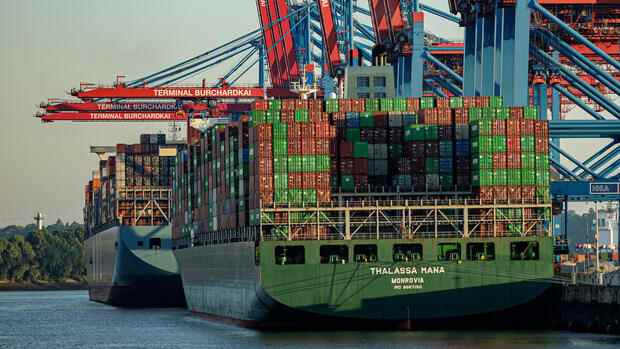German exporters expect relatively little upswing in the second half of the year.
(Photo: dpa)
Berlin Germany’s foreign trade has undergone a historic reversal. In May, imports exceeded the value of exports, as the Federal Statistical Office announced on Monday based on preliminary figures. Germany bought goods and services worth 126.7 billion euros from abroad. That was a billion euros less than was sold abroad in the same period.
That has not existed in the Federal Republic for a long time. Imports have not exceeded exports in a single month for 14 years. The statistics from before 2008 are not comparable due to a changeover, but even in this period the trade balance will have been positive most of the time.
Now a crucial question arises: Is this only a short-term effect due to the Ukraine war or is Germany’s business model – the strong export economy – experiencing structural problems?
For years, Berlin was internationally criticized for its trade surplus. The EU Commission, the International Monetary Fund and former US President Donald Trump saw a problem in the strong German export economy.
Top jobs of the day
Find the best jobs now and
be notified by email.
One point of criticism: Because Germany produces more goods than it consumes, more people are working than necessary, meaning that Germany is exporting unemployment to a certain extent. Foreign countries run into a debt trap because Germany’s many exports ensure that the other countries always spend more money than they earn.
Only a temporary effect due to high energy prices?
The fact that the German trade surplus has now turned into a deficit has been apparent since the beginning of the year. “With rising energy prices, that’s no wonder,” says the Bonn economist Moritz Schularick.
The price rally in oil and gas also lasted about half a year. It is not the amount of goods traded with foreign countries that has changed so much, but their value. Germany simply had to pay a lot more money for its imports than before. This is why imports from Russia increased by 55 percent in the period from January to May compared to the same period last year.
Overall, imports to Germany have increased by 26 billion euros within a year. Exports were also higher, but only by 14 billion euros.
The supply chains disrupted worldwide as a result of the corona pandemic and the war in Ukraine are also having a short-term effect on the trade balance. Many goods could not be produced in Germany due to a lack of material from abroad and then exported, especially cars.
The delivery bottlenecks reduce both imports and exports. “But the effect dampens exports more,” explains Holger Görg, President of the Kiel Institute for the World Economy (IfW). An example of this: if steel and other material for a car do not arrive in Germany, imports of this amount are omitted in the statistics. But the non-produced car that is not sold abroad would be more expensive than the sum of the material, thus dampening exports even more.
Or is it the beginning of a paradigm shift as a result of a new world order?
If energy prices normalize and the war and pandemic come to an end, the large trade surplus in Germany will probably not return, experts expect. “There is a structural effect,” says IfW President Görg. He expects imports and exports in Germany to roughly balance out in the long run.
In fact, the balancing of the trade balance is due not only to the increase in imports, but also to the surprising drop in exports. They fell 0.5 percent in May. Economists surveyed by the Reuters news agency had expected growth of 0.9 percent.
Especially the export of the author industry suffers from the delivery difficulties because there are no preliminary products.
(Photo: dpa)
The economy already sees the German business model in danger. “The export downturn has begun,” says Volker Treier, head of foreign trade at the Association of German Chambers of Industry and Commerce (DIHK). More free trade is “there is no alternative”, added Foreign Trade President Dirk Jandura.
>>Read also: The fear of the world recession
Companies are concerned about a reversing globalization. After Russia, China is also in danger of turning away and disappearing as a sales market. Germany would remain dependent on imports because it has hardly any raw materials itself, but would be able to sell fewer and fewer goods elsewhere.
The federal government and the EU Commission therefore want to find new trading partners, particularly with the help of free trade agreements. Berlin and Brussels have each submitted agendas for this.
However, IfW President Görg does not see any de-globalization in the current development, on the contrary: “The German economy is becoming more and more internationally intertwined.” The structural effect in the trade balance is due to the fact that Germany needs more and more goods from abroad and therefore imports are likely to converge towards exports in the long term. “But that’s not a bad thing in principle.” It just has to be possible to avoid creating new dependencies. According to Görg, one thing is clear: “Germany will continue to be an export nation.”
More: Slump in business expectations – German industry is facing an existential crisis

